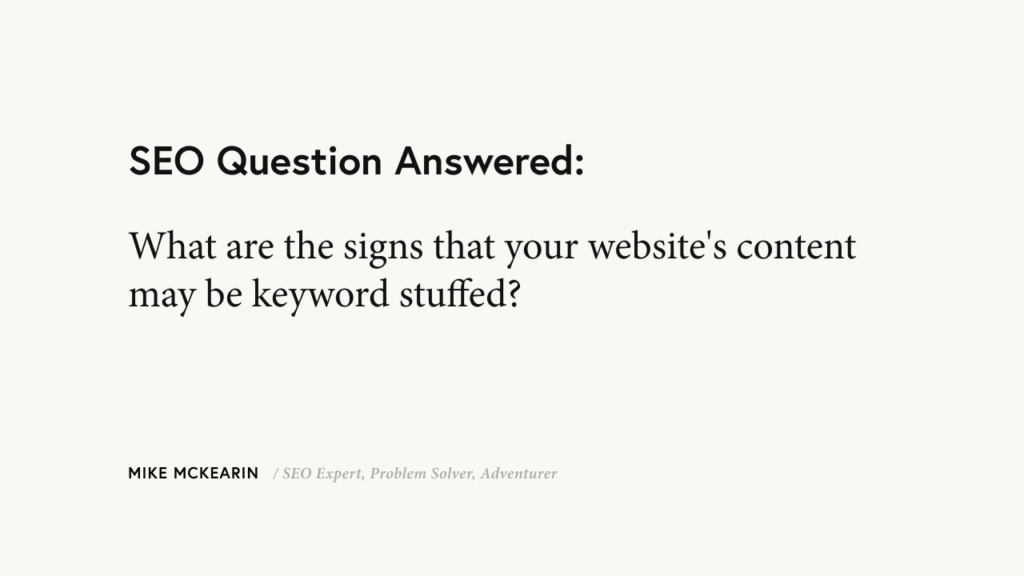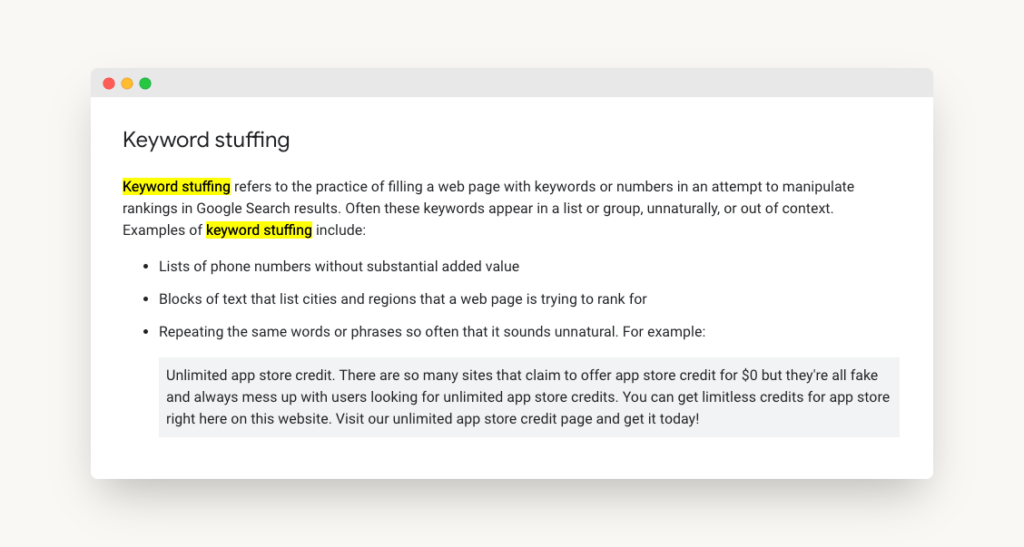The Dangers of Keyword Stuffing and Alternatives for Ethical SEO
SEO Question Answered: What are the signs that your website’s content may be keyword stuffed?
If you’re concerned about whether your website’s content is keyword stuffed, watch out for these red flags:
- Unnatural Language Flow: If the words in your content read like a robot wrote them, with an excessive use of keywords, it’s a major indication that you’ve got keyword stuffing going on.
- Over-The-Top Repetition: If you’re repeating the same keyword over and over again in one paragraph, or if the same phrase appears multiple times throughout the page, that’s a dead giveaway of keyword stuffing.
- Irrelevant Keywords: If the keywords you’re using don’t make sense for the topic, or if you’re trying to manipulate search engine rankings, that’s a huge red flag for keyword stuffing.
- Sneaky Hidden Text: If you’ve got hidden text or links on your page, that may mean you’re trying to stuff keywords into your content without making them visible to your users.
- Keyword-to-Content Ratio: If the proportion of keywords to content is sky high compared to normal, that’s a strong indication that you’re engaging in keyword stuffing.

Introduction to Keyword Stuffing: Understanding the Dangers of Manipulative SEO Techniques
Keyword stuffing is a spammy and unethical approach to search engine optimization (SEO) that has been around since the early days of the internet.
This technique involves overloading a web page with keywords or phrases in an attempt to manipulate search engine rankings.

According to a survey by Moz, up to 20% of Google search results still contain some form of keyword stuffing.
However, search engines like Google have become more sophisticated in their algorithms and are now better able to detect and penalize websites that engage in this manipulative practice.
Consequences of Keyword Stuffing
| Consequence | Explanation |
|---|---|
| Penalization | Search engines may lower a website’s ranking or even exclude it from search results altogether. |
| Banning | In extreme cases, search engines may ban a website from their index, making it almost impossible to find through search. |
| Decreased User Experience | Pages stuffed with keywords can be difficult to read and provide little value to users, leading to higher bounce rates and lower engagement. |
Keyword stuffing is like trying to fit a square peg into a round hole. It’s a desperate and outdated technique that not only fails to improve search engine visibility, but can actually do more harm than good.
In today’s digital landscape, it’s more important than ever to focus on creating high-quality, relevant content that provides value to users.
This is what search engines are looking for, and what will help you achieve long-term success in SEO.
How Keyword Stuffing Works: The Mechanics Behind the Manipulation
Keyword stuffing is a technique that involves inserting excessive keywords into various elements of a web page, such as the content, meta tags, and alt tags.
The goal is to trick search engines into thinking the page is highly relevant for a particular keyword, thus increasing the page’s visibility in search results.
Here’s an example of how keyword stuffing can look in practice:
“Our company specializes in the best quality dog toys. Our dog toys are the best for your furry friend. We have the best selection of dog toys on the market. Whether you’re looking for plush dog toys or chew toys for dogs, we have the perfect dog toy for your furry friend.”
As you can see, the keyword “dog toys” is repeated over and over again in this example, making the content difficult to read and providing little value to users.
This is the hallmark of keyword stuffing, and it’s a clear sign to search engines that the website is attempting to manipulate its rankings.
However, it’s important to note that keyword stuffing can take many different forms, and it’s not always as obvious as the example above.
Some website owners will use synonyms, misspellings, or even hidden text in an attempt to sneak keywords onto a page without drawing attention to themselves.
Despite these efforts to conceal their manipulations, search engines are becoming increasingly adept at detecting keyword stuffing and other forms of spammy SEO.
The Negative Impact of Keyword Stuffing on SEO: Why It’s a Risky Practice
Keyword stuffing is a dangerous practice for several reasons.
First and foremost, it can lead to penalization or banning by search engines, as we discussed in the first section.
This can result in a lower search engine ranking or even exclusion from search results altogether, making it much more difficult for users to find your website.
In addition to the direct consequences from search engines, keyword stuffing can also have a negative impact on user experience.
Pages stuffed with keywords can be difficult to read and provide little value to users, leading to higher bounce rates and lower engagement.
The Negative Impact of Keyword Stuffing on SEO
| Factor | Explanation |
|---|---|
| Penalization | Search engines may lower a website’s ranking or even exclude it from search results. |
| Decreased User Experience | Pages stuffed with keywords can be difficult to read and provide little value to users, leading to higher bounce rates and lower engagement. |
| Decreased Search Engine Visibility | Overstuffing can result in a lower search engine ranking or exclusion from search results. |
It’s also important to remember that keyword stuffing goes against the principles of ethical SEO.
Search engines like Google have a vested interest (and warehouses full of super smart engineers) in providing users with the most relevant and valuable results possible, and they are constantly working to improve their algorithms to detect and penalize manipulative practices like keyword stuffing.
Alternatives to Keyword Stuffing: Ethical Approaches to Improving Search Engine Visibility
So, if keyword stuffing is a dangerous and unethical practice, what can you do to improve your search engine visibility? The answer is simple: focus on creating high-quality, relevant content that provides value to users.
Here are some of the key elements of an effective, ethical SEO strategy:
- Targeting keywords naturally: Instead of stuffing keywords into your content, focus on incorporating them into your writing in a natural and organic way. This will not only improve the readability of your content, but it will also help you rank for the keywords that are most relevant to your business.
- Creating valuable content: Make sure that your content provides value to users, whether that means answering their questions, providing useful tips, or entertaining them with engaging stories. The more value you provide, the more likely users are to share your content and engage with your website.
- Building high-quality links: Link building is an important part of SEO, but it’s important to focus on building high-quality links from reputable sources. This will help to establish your website as an authority in your niche and improve your visibility in search results.
- Utilizing social media: Social media can be a powerful tool for promoting your website and building your brand. Make sure to post regular updates and engage with your followers to drive traffic to your website and improve your search engine visibility.
Final Thoughts: The Path to Success in Ethical SEO.
By following these ethical approaches to SEO, you can improve your search engine visibility and build a strong online presence that will serve you well for years to come.
In this article, we’ve explored the dangers of keyword stuffing and the negative impact it can have on your SEO.
We’ve also looked at alternatives to keyword stuffing, including ethical approaches to improving your search engine visibility.
It’s important to remember that SEO is a long-term strategy, and success requires a commitment to creating high-quality, relevant content and building a strong online presence.
By avoiding unethical practices like keyword stuffing and focusing on ethical SEO techniques, you can achieve long-term success in search engine rankings and grow your online business.
Good SEO is not about tricking search engines, but about creating a website that provides value to users and helps them find what they’re looking for.
In the end, the key to successful SEO is a commitment to ethical practices and a focus on providing value to users. By following these principles, you can build a strong online presence and achieve long-term success in search engine rankings.
About the author
Mike McKearin is the CEO at WE•DO | SEO Expert | Adventurer | Optimist
Mike has a long history in the world of SEO, studying it and testing various methods for over two decades now. When he's not working on his business or being a dad, Mike loves to go on adventures with his family - they live in the beautiful state of North Carolina and love exploring all that it has to offer. He's an optimist who believes that anything is possible if you set your mind to it, and he wants to help others achieve their dreams through WE•DO
Free WordPress SEO Analysis
Want more traffic to your WordPress website? Get a free WordPress SEO Analysis and see how you can improve your traffic to get more sales online.
*This is a human SEO audit. Once we review your site we will reach out to schedule a time to review with you.